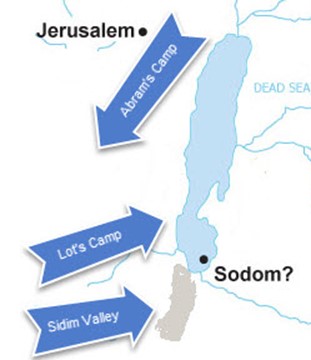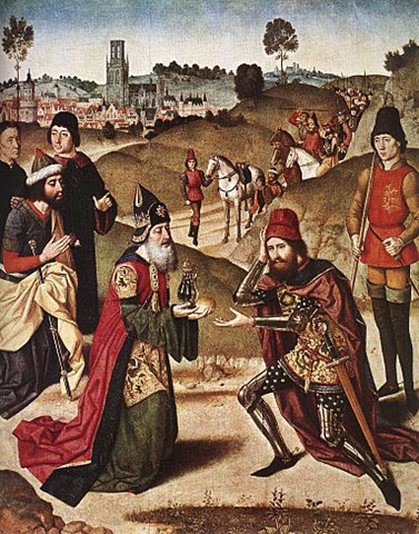The Lists of Hebrews
A Study of the book of Hebrews
Lesson 4 Part 1
Lesson Text: Hebrews 2:1-4, Hebrews 3:7 – 4:16
Introduction
As I have mentioned many times through the course of this lesson, the Christians the Hebrews writer was addressing were backsliding.
Persecutions were discouraging them and the Judaizers were doing their best to pollute the New Covenant with aspects from the old law. Combine those things with basic human weaknesses and they had the perfect conditions for slacking off from their pursuit of the prize.
Do you believe Christians are still slipping away in today’s world?
Is the situation better or worse than it was when the Hebrews letter was written?
Five times in the text of Hebrews, the writer digresses from the main text to give some specific warnings to the Christians he is addressing. There are other warnings in the text where the transition isn’t as abrupt, but they address issues that are just as important as the “traditional” five warnings. In this lesson we will take a look at these warnings.
If we believe Christians are really slipping away…
If we want to prevent ourselves from slipping away…
…it is our duty to fix it!
We skipped over the text related to the warnings in the earlier lessons so we can draw them out all at once. In our discussion, we will see how they applied to the Christians addressed in the letter.
Most importantly we will see how they apply to us. I suggest through this lesson that these warnings are where we should start looking to complete our duty.
Key Warnings For Christians
As much as they are warnings, what follows are the building blocks of faith. Faith is much, much more than an acknowledgment (or a “worldview” as many in society want to say.) We cannot simply ask Christ into our hearts and continue on about our business as if nothing is different.
As we cover each of these items in more detail, consider whether we are testing them in the way we go about our day to day activities. As we will soon find out in the text, God will have a lot to say about how we tested him at the judgment.
- Pay closer attention (Hebrews 2:1-4) We should be more diligent in our Bible study. Anything that is neglected becomes old and useless faster than the things we use and protect. Neglect of our Bible study causes us to drift away
- Care for your beliefs (Hebrews 3:7-4:7) The lure of innovative worship and doctrine, or refusing to leave something old and familiar when the truth is before us will cause us to fall.
- Enter the rest (Hebrews 4:7-13) Following the word of God takes a lot of work and focus. Whether or not we take it on, we will be exposed by it.
- Work toward maturity (Hebrews 5:11-6:20) It is just as fatal to our salvation to do nothing as it is to commit outright sins. You see, doing nothing is an active decision and is therefore a sinful act
- There are no more sacrifices (Hebrews 10:26-29) The last and greatest sacrifice has been made for us. If we refuse to honor that through obedience, there is nothing more that can be done
- Listen to the voice of heaven (Hebrews 12:25-29) God always acted as promised based on the words of his prophets, how much more sure is it that he will act upon the words delivered by his own Son?
- Avoid strange doctrine (Hebrews 13:9-15) Any doctrine that does not come from Christ is strange or foreign. It doesn’t matter if we grew up with it or our best friend taught it to us. Stick to the Bible.
These building blocks are required for strong churches, families and individuals. When properly applied, they make the rest of God’s word easy to follow and a joy to be a part of.
Pay Attention
Imagine a sailor pilots his boat neatly and safely along side a pier.
That sailor feels great to be home. He is finally safe from the storms that came over him during his voyage. He certainly feels entitled to relax and rest from the challenges of getting that boat to his destination.
What if our sailor went to bed that night without doing anything else, because he was sure he would be enjoying the comforts of being in port in the morning? Where would he actually find himself when he awakened? Guess what…
Our sailor never tied his boat to the pier!
He allowed his boat to drift back to sea while he slept. Worse, if he got too far out, it could take a long time to find his way back to a point where he could get his bearing.
We are very much like our sailor when it comes to being prone to drift around (Hebrews 2:1-4) When we neglect the very things that give us salvation, we quickly run out of things that can help us.
If we make our way to Christ, but fail to anchor ourselves to him through neglect, we will drift away. Our soul is subject to the tide and currents of life and a strong bond to Christ is required to maintain salvation.
When our great naval vessels are in port and tied to the pier, a primary responsibility of the watchmen is to go check the mooring lines. Typically every four hours!
That is the same kind of diligence that the Hebrews writer warned his readers to have. As we continue to look at the warnings in Hebrews, this will be the common theme.
Be diligent and do not neglect your salvation!
Care For Your Beliefs and Get into Heaven
Do you test God?
If you know he wants you to do something, and you do not do it, You are testing God!
Worse – It is an indication of disbelief!
What jumps out at you as you read these verses?
7 Therefore, as the Holy Spirit says,
“Today, if you hear his voice,
8 do not harden your hearts as in the rebellion,
on the day of testing in the wilderness,
9 where your fathers put me to the test
and saw my works for forty years.
10 Therefore I was provoked with that generation,
and said, ‘They always go astray in their heart;
they have not known my ways.’
11 As I swore in my wrath,
‘They shall not enter my rest.'” (Hebrews 3:7-11 ESV)
These verses remind us what happened to the children of Israel:
- God spoke to his children
- They hardened their hearts and were not moved by God’s demonstrations
- God gave them forty years to get right
- God felt tested by disobedience and discontentment
- God was provoked and gave up on them
- They never got to the promised land
The Hebrews writer wanted his audience to know their backsliding was leading them down the same path that Israel took. When we fail to obey God, when we demonstrate unbelief in this way, we are allowing evil to creep into our hearts.
Hebrews 3:12 says the opposite of what too many people teach. Unlike what many claiming to follow Christ try to tell us…
We can fall away!
Read it for yourself:
12 Take care, brothers, lest there be in any of you an evil, unbelieving heart, leading you to fall away from the living God.
The evil that lurks within disbelief will chip away at our salvation. Just like the children of Israel, our entry into the rest will be blocked if we are provoking God.
So how do we care for our beliefs?
First, we have to get ourselves in the presence of other believers. (Hebrews 3:13-19)
Here are the writer’s exact words:
Do not harden your hearts
What is going to harden your heart – A group of fellow believers or a group of doubters?
What we hear has a powerful influence on us.
- If we spend a lot of time with negative people, our own words will become negative as we listen to theirs.
- When we hear ourselves say loving things to our spouses, our marriage bonds become stronger.
- When we repeat things others say enough times, we tend to start treating those things as fact, even if we never did the research.
Being united with other Christians works just like being in an army. If that army is cohesive and following the same plan, the many individuals become a powerful unit able to accomplish much more than the simple sum of what each one has to offer.
Second, we need to remain fearful. (Hebrews 4:1-5)
Fear is not a bad thing to have!
- Fear makes sure we look both ways before we cross the street.
- Fear keeps us from walking too close to the edge
- Fear causes our senses to remain sharp and on the lookout
A healthy dose of the fear of God will keep us faithful! And the writer wanted his readers to know that kind of fear will get you into heaven. The sharp senses that the fear of God gives us will keep our ears open and cause us to us to take the actions of belief when we hear him speak.
Third, we have to strive to enter heaven (Hebrews 4:6-13)
There is no occasion for coasting on our journey to heaven. Like the children of Israel who fell into the sands of the desert, we will fall away if we quit working for it. The lack of effort and urgency will cause the unbelief to slip in.
Maybe without us even noticing it!
When we stay on top of our beliefs, when we feed them and care for them, we will notice when we are are in danger of provoking God. God’s word is very powerful in this regard. We use Hebrews 4:12-13 so much that it is almost cliche’, but make no mistake – When we study and study and study and become really familiar with it, God’s word will expose our every weakness.
Fixing those weaknesses is the work we are responsible for.









August 30, 2015
1 Comment